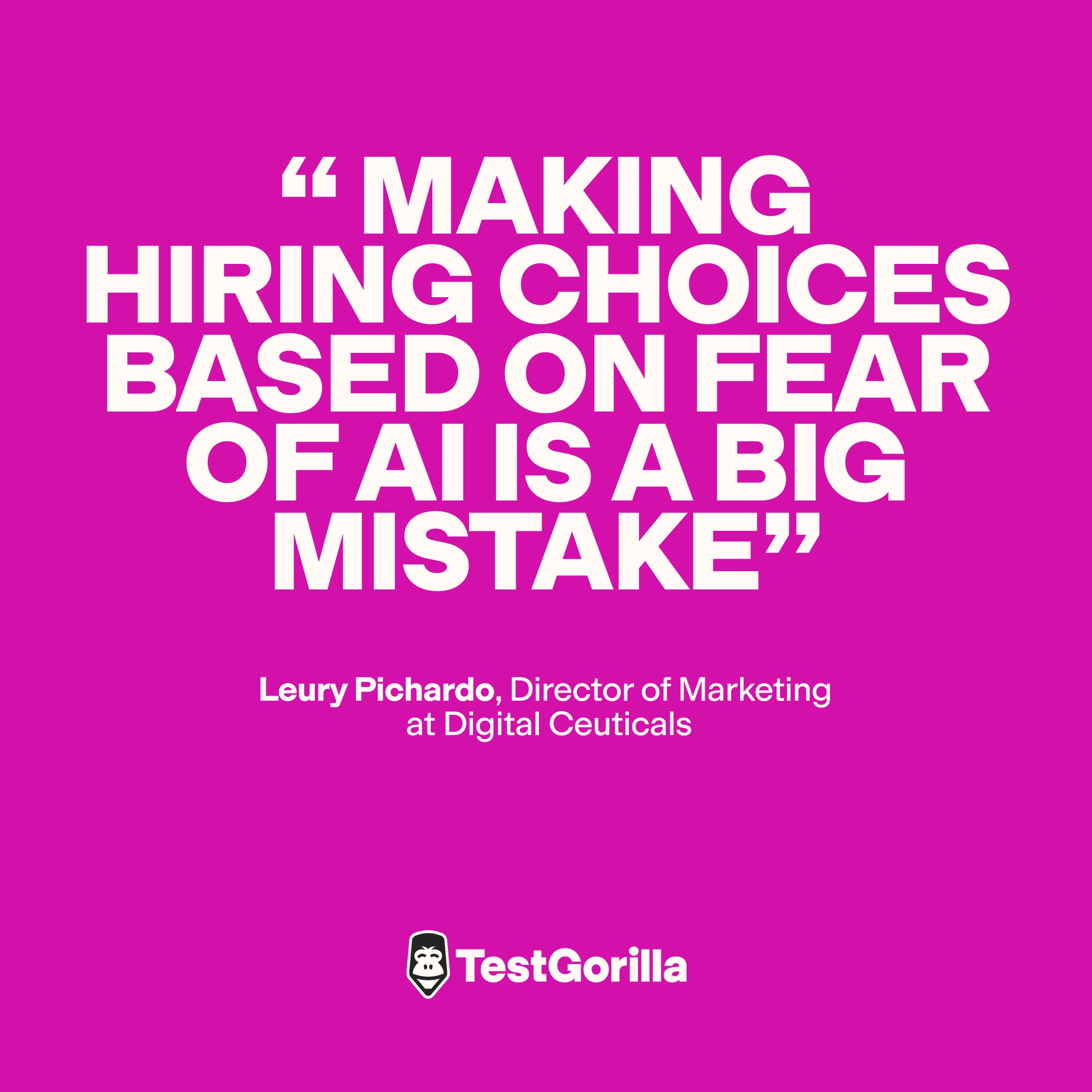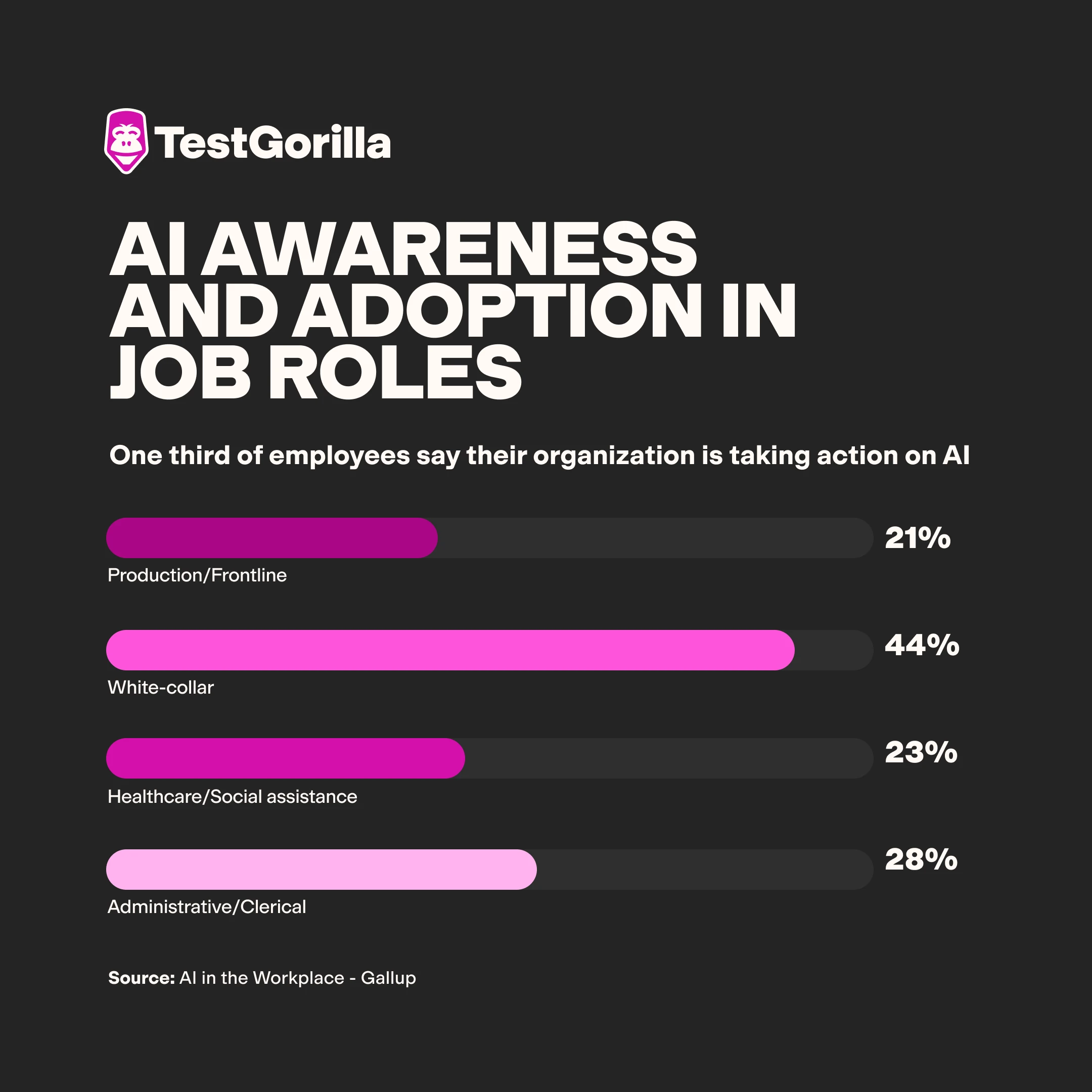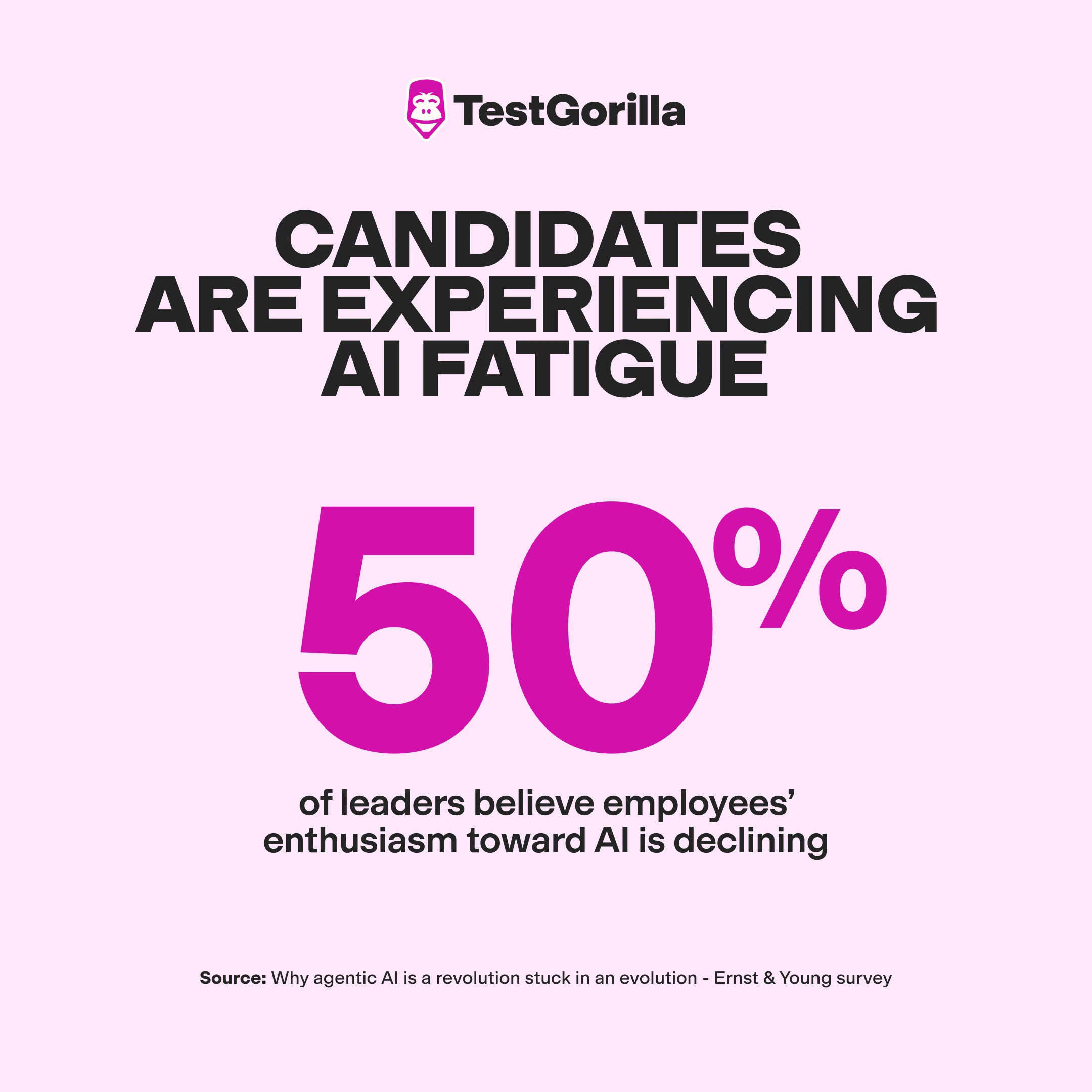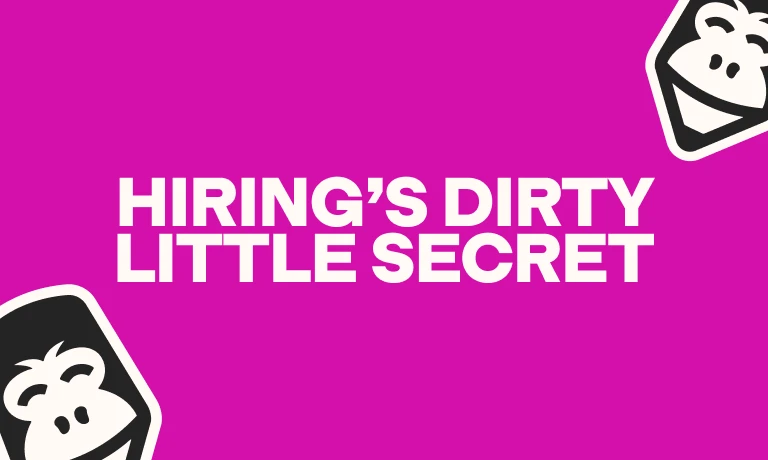AI has made its way into nearly every corner of the working world, and hiring is no exception. Most employers are using AI in recruitment in some way, shape, or form.
Naturally, they assume job seekers are doing the same. We surveyed employers and job seekers for our most recent annual The State of Skills-Based Hiring report – and 73% of employers told us they’ve seen a spike in AI-generated resumes.
But here’s the twist: Only 37% of candidates say they’re using AI in their job applications. That’s a surprisingly low number considering the hype.
So, what’s going on?
Below, I unpack how candidates feel about using AI and why it isn’t dominating job applications the way everyone assumes.
The "everyone's using AI" misconception
Many candidates are using AI in their job applications to summarize job descriptions, brainstorm ideas, polish spelling and grammar, and practice interview questions.
If you ask me, using AI in these ways is OK. If employers are free to use AI as they need to, candidates are free to do the same. So why might some companies have problems with candidates over-using AI?
Employers are concerned about applicants overusing AI
An issue arises when candidates use AI to generate entire resumes, cover letters, or application forms. Applications start to all look the same.
One of the unfortunate aspects of using AI-generates resumes is that, by design, they tend to look the same. People will be using the same source material, the same data scraped by the classifier.
As a hiring manager, I don’t want to see a sea of similar but high-quality resumes. I want to see who stands out and who’s going to catch my attention – and that’s where AI really falls short. We will all become the same homogeneous blob of applicants if we rely on the same AI tools to create our resumes.
– Joel Windels, Marketing Leader
Another problem employers face with AI is the nagging feeling that candidates use it to cheat in online tests and virtual interviews. While most candidates don't cheat, these fears aren't unfounded.
We surveyed more than 1,000 job seekers and found that while only 17% cheat on tests, seven in ten of those who do cheat use AI to do it.
Lucy Dewhurst, our Content & Product Marketing Lead at TestGorilla, has had first-hand experiences with AI-based cheating. "We found a recent candidate was reading aloud real-time answers from an AI bot as I asked the questions – which was a new one and hard to spot unless we really listened."
That said, employers are developing AI paranoia
Although it’s certainly an issue, obsessing over candidates using AI in their applications is no good.
We spoke to Mindy East, Founder & Principal Consultant at Lime Rock Consulting, who shared, "I think fears around cheating or AI misuse are often exaggerated. Most people are using these tools to brainstorm, not to cut corners. The bigger issue I see is that hiring teams can get so fixated on detecting AI that they miss the real person behind the application."
Mindy's not wrong…
According to our latest research of more than 1,000 employers, 73% are noticing more AI-generated resumes, and seven in ten said they were "easy to spot." Even though only 37% of candidates use them. It doesn’t add up.
The stats tell a different story about candidates’ AI use
Not convinced? We also studied how long candidates are spending on their applications and found that more than half are spending between one and three hours, which is a considerably long time if they're using AI to write everything for them.
When you hear and read so much about the use of AI in job applications on LinkedIn, the news, etc., it's easy to assume more people are using it than is true – this is a common bias called the availability heuristic.
Or, you could be dealing with the frequency illusion, where you notice the use of AI in a handful of applications and start spotting it everywhere – every polished resume or cover letter feels AI-written.
The risk?
According to Roy Andraos, CEO at DataVLab, "Suspicion around AI use can introduce bias in screening. Recruiters may dismiss thoughtful applications because they 'sound too polished,' even if they’re sincere. That’s dangerous."
Similarly, Leury Pichardo, Director of Marketing at Digital Ceuticals, said, "Worrying too much about basic AI use is a silly distraction that punishes good candidates (this used to be me). I’d rather see someone use AI to improve their resume than someone who doesn't even check their spelling. Making hiring choices based on fear of AI is a big mistake."
Fewer job seekers are using AI than you think, and understanding why can help alleviate AI paranoia.
So, why are job seekers using less AI in their job applications?
Here's why, contrary to popular belief, fewer candidates are using AI when applying for roles.
1. There’s a digital divide
It’s easy to assume everyone’s using AI, but not every job seeker has access to these tools or knows how to use them, let alone how to prompt them well. Some don’t even know they exist.
The AI Divide, a survey of more than 4,000 participants worldwide, showed that only about 50% use generative AI. Of those who use it, 65% are Millennials and Gen Z users. Moreover, 68% of non-users are Gen X or Baby Boomers, and 40% said they didn’t know how to use it.
People’s jobs and sectors can also play a role in their AI use. According to a study by Gallup, AI awareness and adoption are higher for people in white collar jobs (44%) compared with administrative workers (28%), healthcare staff (23%), and frontline team members (21%) who rely on traditional resume-writing and application methods.
In fact, eight in ten frontline employees said they never use AI. These jobs make up 70% of the US workforce – it’s no wonder fewer job seekers are using AI than expected.
2. AI fatigue is real
Some candidates are simply tired of AI.
I spoke to HR and hiring expert Yashna Wahal, who said, "When ChatGPT first came out, it was like an exciting toy. Don’t get me wrong, it’s still impressive, but users, including candidates, have started getting frustrated with it. After all, using AI tools well takes practice," Yashna explained.
Crafting the right prompts, fixing mistakes, and refining results can sometimes take longer than just writing a resume or cover letter from scratch. "And let’s face it, many job seekers are sick of being reduced to a few generic sentences and keywords that don’t reflect who they really are or what they bring to the table," Yashna added.
Candidates could also be experiencing a deeper, more pervasive form of AI fatigue – the mental exhaustion from seeing and hearing about AI everywhere – online, at work, and more. An Ernst & Young survey showed that 50% of leaders believe employees’ enthusiasm toward AI is declining.
Something interesting we found in our research is that candidates who feel negatively about employers using AI in hiring tend to be the same people who don’t like using AI in their job applications.
3. Candidates want to stand out, not blend in
Today’s candidates are also dealing with a tough job market. According to a recent article, the economic outlook has been "shaky" for recent grads and others looking for jobs after a slowdown in job growth. The unemployment rate for adults between the ages of 22 and 27 has gone up to 5.8% – well above the average of 4.2%
This means several applicants are competing for the same roles, and it’s putting more pressure on them to stand out.
Many of these applicants are cutting back on using AI tools, as they’re aware that the tools often lead to the same structures and phrasing across resumes, cover letters, and even interview answers.
"As someone who has hired over 100 people, I've probably seen more than 10,000 different CVs. When you’re flipping through them, some get barely 30 seconds of attention. In those 30 seconds, I’m looking for what’s different, not what’s the same.” – Joel Windels, Marketing Leader
Some of these job seekers are instead writing thoughtful, human applications, building personal websites and portfolios, creating custom videos and decks, taking skills assessments, and looking for other opportunities to showcase their achievements and stand out from other applicants.
4. Job seekers are scared of being judged or disqualified
Many job seekers don’t use AI in their applications because they’re scared it could backfire.
Some worry about being judged as lazy or dishonest. Others think their applications might get flagged and discarded.
And this fear is real. For instance, 70% of employers claim they can spot AI-generated resumes.
Additionally, while some employers don’t mind the use of AI, others aren’t happy about it – and job seekers are well aware of this stance. For example, Jessica Glazer, Strategic Recruitment Director, put it plainly –
"It's so disappointing and such a waste of time for everyone. Candidates think their resume or emails look great but it doesn't at all. The resume just looks extremely artificial, or too polished … with ZERO substance."
5. People think AI is "sus"
Let’s be honest – some folks simply don’t trust AI. In a world where our data is constantly at risk, some job seekers worry that if they paste their resumes, backgrounds, or other information into an AI tool, it could get stored or shared without their knowledge.
This is even more true for candidates who don’t understand how AI works and prefer to stay away from it – for instance, older candidates or those from certain sectors, as mentioned before.
There are plenty of Reddit posts questioning how AI uses people’s data to train itself and replace their jobs – and that’s enough to make people pause.
And the distrust isn’t unfounded. Here's what I read on OpenAI's privacy policy: "We may use Content you provide us to improve our Services, for example, to train the models that power ChatGPT."
Some recruiters think AI is “sus,” too. Learn why some are opting out of AI resume screening – plus the fairer alternative.
6. In rare cases, candidates don’t know they’re using AI
Some job seekers use AI without even realizing it. Tools like Microsoft Editor, Grammarly, or even built-in writing suggestions on Google Docs help fix grammar, improve tone, and reword clunky sentences and phrases. But many candidates don’t realize these count as AI.
So when candidates told us they haven’t used AI, some might have still relied on tools powered by it in some way.
This came to light in our conversation with Lucas Botzen, HR & Career Expert and CEO at Rivermate, who pointed out, “Many use AI tools to polish language or correct grammar, which can actually improve the clarity of their application without erasing their unique voice.”
The best insights on HR and recruitment, delivered to your inbox.
Biweekly updates. No spam. Unsubscribe any time.
The AI hype may have peaked, but it's not going anywhere
AI is now everywhere, including job applications. Candidates often use it to refine resumes or prep for in-person, virtual, or AI interviews. But employers worry that AI is taking away authenticity completely and can lead to lazy applications and cheating on online tests.
This fear has created AI paranoia – where employers believe all job seekers are using AI – which isn’t the case because of tech gaps, trust issues, AI fatigue, and the desire to stand out as humans. And even those who are using it often do it in small and thoughtful ways that shouldn’t impact how employers view them.
The AI hype may have peaked, but it’s not going away, so I think it’s best if employers and candidates continue treating AI as a helpful assistant – all while remembering that both hiring and applying still need a human touch.
Related posts
You've scrolled this far
Why not try TestGorilla for free, and see what happens when you put skills first.





















